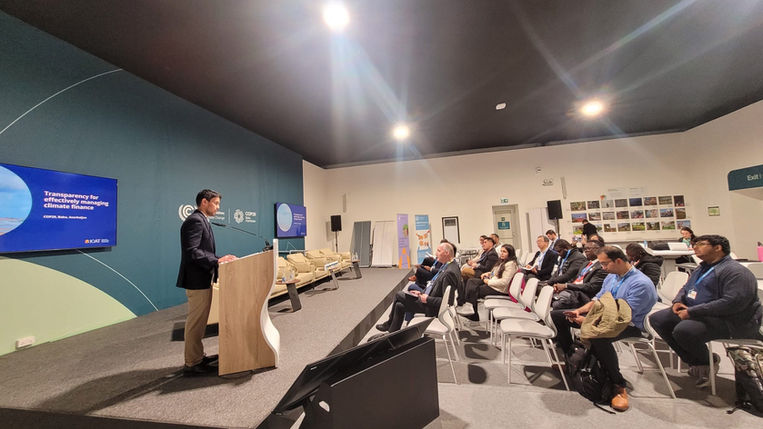
Our Message to Global Leaders
At COP29, CCAP urges governments, the private sector, financial institutions, and civil society to urgently scale up actions to meet the climate challenge.
We believe in:
-
Promoting climate resilience for vulnerable communities, a fair and equitable transition and scaled-up adaptation finance that reaches the most marginalized groups and at-risk regions.
-
Setting clear and actionable climate policies that support long-term decarbonization pathways, while safeguarding the rights and well-being of marginalized groups, including local and Indigenous communities.
-
Integrating nature-based solutions and biodiversity preservation into national climate action plans, recognizing the role of ecosystems in mitigating and adapting to climate change.
-
Encouraging the private sector’s leadership in driving sustainable investment, corporate accountability, and innovation in low-carbon solutions, while ensuring these actions align with global climate goals.
How Countries Can Lead Climate Action
Implementing Article 6
CCAP advocates to finalize the guidance for the full implementation of Article 6 and to support countries for its operationalization, while promoting social and environmental integrity. We call on countries to:
• Finalize the Article 6 Rulebook: Provide clear, robust guidelines that enable countries to trade carbon credits in pursuit of their national climate goals, while strengthening the credibility of carbon markets, which have been affected by recent distrust issues. The rules for international carbon markets must ensure transparency, additionality and prevent double counting.
• Enhance Social Integrity in Carbon Markets: Article 6 discussions should prioritize the rights and needs of Indigenous Peoples and Local Communities, ensuring they receive fair and equitable benefits from revenues generated through Article 6 activities.
• Support the Operationalization of Article 6: While finalizing the Article 6 rules is crucial, it is equally important to assist countries in building the capacity and institutional frameworks necessary for its implementation. CCAP will present a report at COP29 outlining the main challenges Latin American countries face in the implementation and operationalization of Article 6.
Enhancing Transparency
Transparency is viewed as the backbone of the Paris Agreement, and countries must enhance the transparency of public and private finance to align with global climate goals. With the New Collective Quantified Goal (NCQG) set to be defined at COP29, CCAP is advocating to operationalize and implement Article 2.1(c) of the Paris Agreement for countries to shift from brown to green investments.
Parties are expected to launch their NDCs 3.0 in 2025 and are currently revising them to raise ambition to meet their Paris Agreement obligations.
COP29 is labeled as the finance COP, as it will set the stage for Parties to negotiate and finalize the NCQG on climate finance. In response to the shortcomings around the $100 billion promise and implementation of adaptation and mitigation efforts identified in the Global Stocktake of 2023, it is essential that countries prioritize the scaling and mobilization of climate financing towards decarbonization pathways. For COP29 in Baku, adequate and sufficient climate finance remains a high priority on the global agenda.
Achieving the Pledge
Mitigating methane is widely recognized as the most effective short-term strategy for combating global warming, which has led over 150 countries to endorse the Global Methane Pledge. At COP29, nations will focus on accelerating global efforts to reduce methane emissions across all sectors, with a particular emphasis on waste and agriculture. This will support the implementation of the Pledge while delivering co-benefits for food security, environmental resilience and socio-economic development.
As countries work towards launching their updated NDCs 3.0, we anticipate stronger commitments to methane reduction targets, beginning at this COP. For example, ahead of COP29, the COP presidency introduced the Methane Reduction from Organic Waste Declaration, promoting waste diversion strategies to address emissions at the source.
To make real progress in tackling the climate crisis, governments, businesses, financial institutions and civil society must intensify efforts to curb methane emissions. Despite ambitious commitments made at previous COPs, methane emissions continue to rise, particularly from oil and gas production, highlighting the urgent need for effective mitigation measures. Now is the time to move from pledges to tangible implementation, ensuring that regulations are enforced, financing mechanisms are readily available and technological innovations are effectively deployed.
Sights from Baku
Stop by our Exhibit Booth | #32
Nov. 20-21
Be sure to stop by and connect with us at our Exhibit Booth from Nov. 20-21, as part of the Education, Science and Technology section.
Don't Miss These Events!
Climate Policy Insights
Follow Our COP29 Journey


























